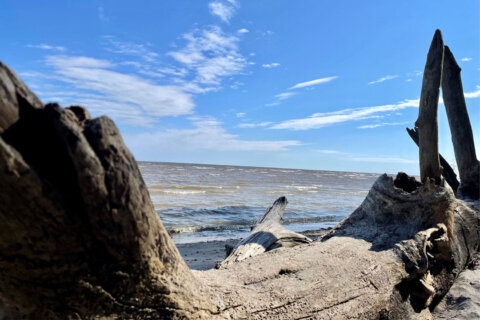In the 1960s, the Potomac River was declared a “national disgrace” by President Lyndon B. Johnson.
Decades later, the condition of the river has earned a “B” from the Potomac River Conservancy.
At a news conference Tuesday, the Potomac Conservancy released its report on the health of the river that runs into the Chesapeake Bay.
Among the findings in the report, the decline of industrial and agricultural pollution has resulted in improved health of the river. Hedrick Belin, President of the Potomac Conservancy explained “that pollution reduction really drives a number of the other successes we were able to report on, whether it’s for wildlife or for people.”
Fish and wildlife, including bald eagles, have rebounded, according to the report, and Belin said that includes the appearance of bottlenose dolphins in the southern end of the river.
“Those dolphins are coming into the Potomac to raise their young in the shallow tidal waters,” he said, calling that “another great indicator that reducing the pollution improves the habitat which both the aquatic and terrestrial wildlife depend on.”
However, concerns about the future remain. Belin explained that climate change and urban runoff combine to worsen water quality. The increasing intensity of storms has resulted in more runoff being dumped into the Potomac. Belin said “when it rains really hard, our streams and then the Potomac, get infused with a ton of pollution” including fertilizers, oils from road surfaces and even diluted sewage.
He also said deforestation in the region is a major concern, and referenced a report that showed that 45% of all trees lost in Maryland were in Montgomery and Prince George’s counties. Belin said “that’s why we were so excited that the General Assembly updated the forest conservation act” during the latest session.
That update establishes increases in tree replanting requirements across the state. In an op-ed for WTOP news partners Maryland Matters, he called that legislation among “the most significant changes to Maryland state law on forest conservation in the past thirty years.”
One of the goals of the Potomac Conservancy is to attain a “swimmable” and “fishable” Potomac River.
Those goals are shared by the Potomac Riverkeeper Network. Dean Naujoks, the riverkeeper for the Potomac, told WTOP in an interview that he agreed that the Potomac River’s current condition rates a “B.”
“When it comes to nutrients and bacteria, this river’s come a long way,” Naujoks said. “In 1965, it was choked with algae” and said the water collection samples tested by the Riverkeeper Network show definite water quality improvements.
Naujoks also agrees that the biggest “most egregious” sources of pollution into the Potomac, including large industrial waste, have declined markedly. He concurred from the findings that the biggest issues facing a cleaner Potomac River are climate change and urban and agricultural runoff. Both he said, were “still a very, very serious problem for water quality.”
Both groups point out that while conditions in the Potomac River have improved from a D in 2011 to the B assigned in today’s report, there’s still a lot of work to be done.
Belin told WTOP that the “easier stuff” like obvious, visible sources of pollution running directly into waterways has been addressed in past decades. Now, he explained, there’s a continuing need to pay attention to preservation of forests and addressing runoff and he remains optimistic.
“We believe we’re on track by the next 10 years, to be in a position where we have a river that is swimmable, that you can splash around in 365 days of the year,” said Belin.
“Our whole mission of being Potomac Riverkeeper is to always stay vigilant, always work to address the next issue and eliminate all these sources of pollution that are threatening water quality,” Naujoks said.








